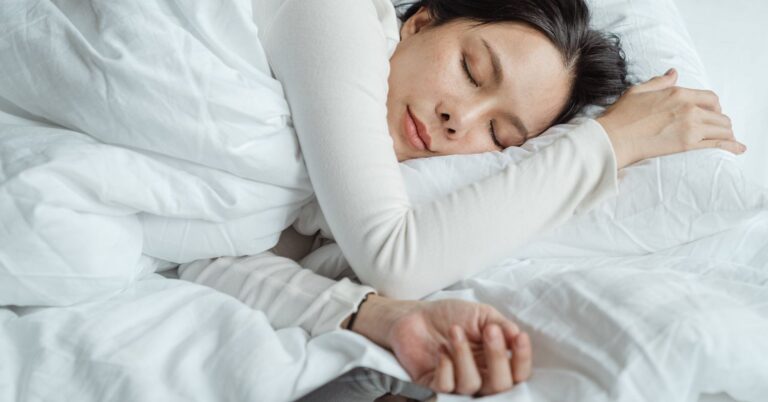I remember a few years ago, I read a quote from former First Lady Michelle Obama about equity in marriage. She recollected not having time for herself, for exercise, for her own mental health, for her hobbies. In contrast, her husband always seemed to fit these things into his busy schedule. And that’s when she realized he just “did it.” So, she decided to just make time for herself and just do the things that were important to her, and she and her husband would both learn to work around this.
I remember being so inspired by this action-driven approach to the problem. That is until I read her autobiography and actually learned that in order to do this, she was getting up at 5 a.m. to go to the gym. I will give her the benefit of the doubt and assume she is a lark and goes to bed early in order to get a good night’s sleep. But it does beg the question, why is there such global disregard for good sleep? After all, we all know how important it is; we spend a third of our lives doing it, so why are we not more protective of it, just in the same way we eat healthily and exercise well? (Well, some of us, anyway!)
This disregard for good sleep health came into focus again recently when I heard rumors circulating on Twitter that the UK might switch to permanent Summer Time (for our U.S. readers, this is the equivalent of Daylight Saving Time). Whoever came up with that name in the marketing department, give them a raise! Who doesn’t want more sun, more summer, more daylight? But in actual fact, it doesn’t give us more daylight; it just shifts the period of light by an hour. So, we end up having more sunlight in the evening, but it comes at the expense of less light in the morning.
Before we get into the details, let’s think about why we need light.
The easiest way to think about this problem is to think about three different clocks. The sun clock (based on the rotation and tilt of the Earth), the social clock (which determines when we go to work, meet people, catch a train, etc.), and our body clock (which dictates our body’s natural rhythms such as our sleep/wake rhythm). Ideally, all three clocks are in sync. One of the challenges with the body clock is that, for many of us, it runs slightly longer than 24 hours. The sun helps us reset our body clock each morning and helps us stay on a 24-hour cycle so that the sun, social, and body clocks are in sync. During Standard Time (during the winter), this is how things work, happy days!
However, twice each year, we change our social clock. In springtime, we shift our social clocks one hour ahead. We stay on this schedule all summer and then switch back to Standard Time in Autumn.
Of course, everyone loves having more light in the evening in the summer. However, there are two problems with the switch. One is the short-term impact of losing an hour of sleep when the clocks change. The short-term loss of sleep in the few days after the clock change in Spring (when we lose an hour) has been associated with a whole host of issues, including an increased number of missed doctor appointments (Ellis et al.), more traffic accidents (Pratz-Uribe et al. and Fritz et al.), and increases in heart attacks (
Manfredini
et al.).
The other problem with the clock change is the persistent detriment to our sleep and health for the whole duration of summer because we have a social clock that is out of sync with our sun clock time (it is an hour ahead). So, during summertime, when the clock says it is noon, the sun is not at its highest point in the sky yet; according to the sun, it is only 11 a.m. In the morning, our alarm goes off at 6 a.m., and the sun is telling us it is 5 a.m. And when we get to the evening time, and it is 11 p.m., and we are ready for bed, the sun time is showing 10 p.m., and it is still light.
“Great, more sunlight in the evening,” I hear you say, especially those amongst you who are night owls and love the summer evenings. Unfortunately, this is not conducive to sleep; as explained above, our body clocks are set by the sun, so we need sunlight in the morning to reset our body clocks, and we need it to be dark in the evening so that we know it is time to go to sleep. Living the entire summer on “Summer Time” means we are effectively living in the wrong time zone. Because our social clock is an hour ahead it’s like we are living on European time. So, we might feel jetlagged all summer. But we cannot adjust, because, of course, the sun clock doesn’t change.
A natural experiment to highlight the challenges of Summer Time (so permanently living in the wrong time zone) comes from studies comparing the sleep and health of those living on the Eastern side of the time zone with those in the Western part. Let’s think about the Central European time zone for a moment. Let’s think about a city far in the East, say Warsaw (Poland), and then far West, say Madrid (Spain). They are both in the same time zone. The sunrise in October (before the clock changes) in Warsaw is around 7:30am, but in Madrid, it is at 8:30am. Imagine two people both going to work at 8 a.m., one in Warsaw and one in Spain, one in the daytime, one in the dark.
So, living in the wrong time zone because your social clock and sun clock are not aligned is tricky, and you don’t get enough sun in the morning to reset your body clock. Scientific evidence backs this up and highlights that those in the most Western part of the time zone get less sleep and have poorer health outcomes (
Giuntella
et al.). Now imagine this all year round!
Do people need this clock change, or is there a better solution?
In an ideal scenario (and many sleep associations agree, such as the American Association of Sleep Medicine [Rishi et al.] and Sleep Research Society [Malow et al.]), we would abolish the clock change and implement Standard Time all year round. In that scenario, the sun, body, and social clocks would all be the same and aligned more or less perfectly. However, there are some that are advocating for permanent Summer Time (or permanent Daylight Saving Time for our U.S. readers). That is the worst-case scenario.
More evening light sounds good to everyone, especially in the dreary UK winters, but as mentioned above, it comes at the expense of less light in the morning. In the winter in London, on the shortest day of the year (the 22nd of December), the sun rises at 8:04, and in Lerwick (Shetland, one of the most northern spots of the UK), the sun rises at 8:40. If we kept Summer Time all year round, and our clocks were constantly one hour ahead, that would mean in London the sun wouldn’t rise until 9:04 and 9:40 in London and Lerwick, respectively. And I think we can all agree that no one wants that.
Interestingly, there have been instances where this was tried; for example, in 1974 in the U.S., all-year-round Daylight Saving Time was implemented, and it was abolished only 10 months later because people didn’t like how dark it was and the increased rates of accidents in the winter mornings. For similar reasons, Russia abolished permanent Summer Time after a three-year experiment. So, we sleep researchers are advocating for permanent British Standard Time and against permanent Summer Time (or against permanent Daylight Saving Time).
One of the challenges we face from policymakers is the misperception that permanent Summer Time is what the people want. However, a public survey in 2018 showed that the majority wanted the clock change abolished and permanent Standard Time instated. However, change was stalled because of other priorities during the pandemic. Now that we are through one of the darkest periods of our lifetime, it is time to focus on the sun again.
It is important that we don’t fall into the trap of “saving daylight”. We need to fight for morning light and against the detrimental impact permanent Summer Time would have on our health and safety.


















+ There are no comments
Add yours